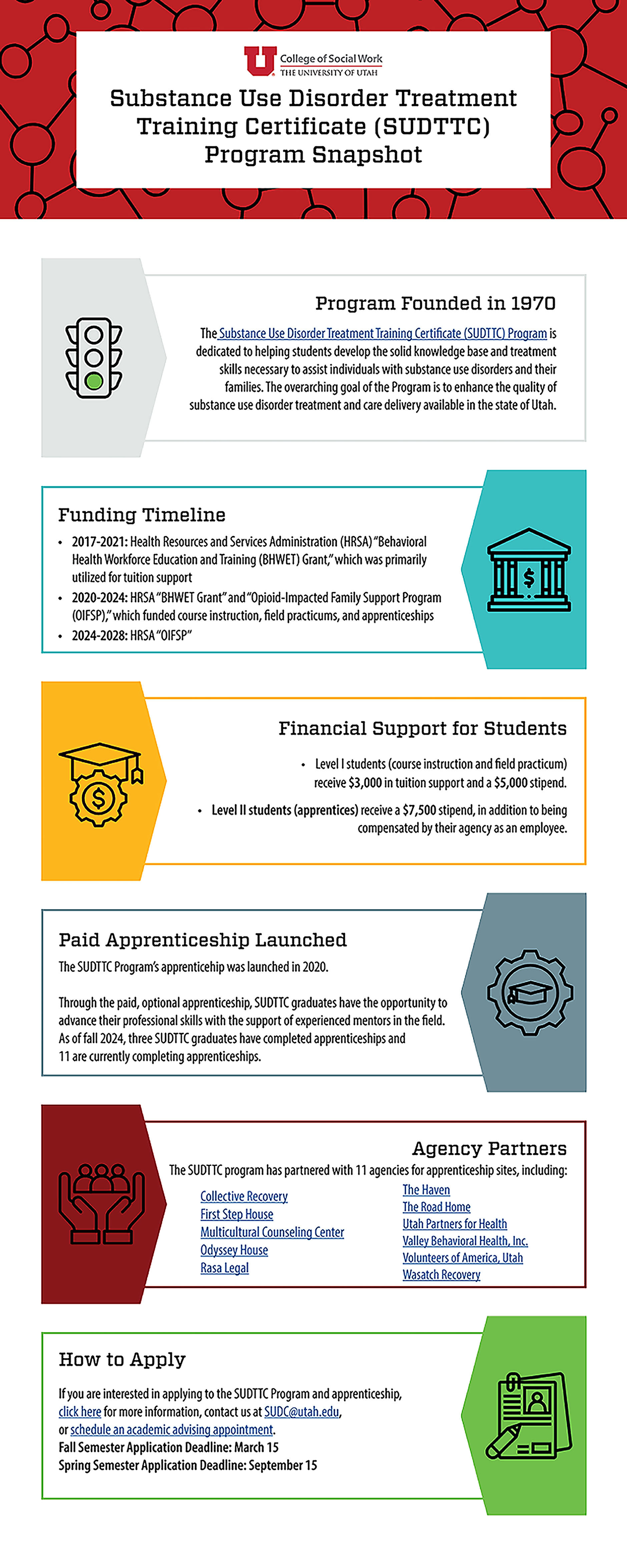Earning While Learning: Jumpstarting a Career as a Substance Use Disorder Counselor with a Paid Apprenticeship

Stepping into a career in behavioral health—particularly specialized fields like substance use treatment—can be both exciting and overwhelming. To further bridge the gap from classroom concepts to proficient practice, the University of Utah’s College of Social Work (CSW) offers paid apprenticeships for graduates of its Substance Use Disorder Treatment Training Certificate (SUDTTC) Program.
Open to undergraduate students, as well as paraprofessionals, the SUDTTC Program offers a blend of education and focused practical applications to support professional growth. While supervised field experience has always been a critical component of the SUDTTC Program, the recent addition of an optional post-graduate apprenticeship provides supplemental support.
Alexia Murphy, a policy specialist at the Utah Department of Workforce Services, said the apprenticeship offers graduates a unique chance to build upon their foundational skills under mentorship. “The apprenticeship is another opportunity to extend supervised time and have additional financial help as [SUDTTC graduates] start their careers,” she said. “The apprenticeship is a more structured way for people to work on mastering specific skills, while working very closely with an experienced mentor.”
Although the apprenticeship model has been utilized by numerous skilled trades for centuries, it is new to the behavioral health space. In 2020, the SUDTTC Program launched its apprenticeship with Health Resources and Services Administration (HRSA) funding to expand and strengthen substance use treatment services in the state of Utah.
Murphy recognizes the importance of fostering training efforts for behavioral health professionals, given the shortage across the state of Utah and nationally. According to the Office of Professional Licensure Review, federal data from the Substance Abuse and Mental Health Services Administration (SAMHSA) revealed that only half of Utahns with pressing behavioral health care needs are receiving services.
“We know there is a need. My hope is that we have much more confident professionals coming out of the apprenticeship to meet the demand for care,” said Murphy.
As the first SUDTTC graduate to complete an apprenticeship, Rylee Johnson-Wheelock echoed acclaim for the program in preparing her for a career in substance use treatment. “The SUDTTC Program and my apprenticeship provided an abundance of support as I entered into this career and subsequent licensing journey,” she said. “Not only was it a good reminder of the core competencies of my license, but the apprenticeship helped me find my footing and my ‘mojo’ within the field.”
Johnson-Wheelock graduated from the University of Utah in 2021 with bachelor’s degrees in psychology and criminology, and a minor in sociology. After completing her degrees, she began working with people with obsessive-compulsive disorder and other anxiety disorders in an intensive outpatient program.
She soon decided to work toward her license in substance use disorder counseling as a continuing education student in the SUDTTC Program. Johnson-Wheelock recalls her practicum and apprenticeship as “enlightening.” Working with First Step House, she performed numerous roles as a case manager and a group counselor in a permanent supportive housing unit, and then as a treatment support specialist in residential treatment.
Johnson-Wheelock said the support from Jason Castillo, former director of the SUDTTC program and current associate dean for academic affairs at the CSW, was transformative. “It is difficult work … but never once did I feel hesitant to reach out.” She continued, “Jason gave me feedback and support in my evaluations. My professors in the program were also very supportive and responsive to my questions about obtaining licensure.”
Castillo recognizes the motivation of high-achieving students who have excelled in the SUDTTC Program and apprenticeships so far. “Many students and apprentices are their own toughest critics,” he said. “Apprentices are driven to improve and often compare themselves to those with five or more years of practice experience with clients receiving substance use treatment. During my evaluations with apprentices and their supervisors, we highlight what they are doing well and focus on their strengths.”
Johnson-Wheelock likewise attributes her professional growth to her clinical supervisor’s mentorship, and the “phenomenal” support system of colleagues at First Step House.
“Looking at my first client session to my latest individual session, I feel like a completely different counselor,” said Johnson-Wheelock. “My supervisor taught me to think about the core competencies and challenged me to see them from the perspective of my clients and their needs … it shifted my mindset.”
After completing her apprenticeship in December 2023, Johnson-Wheelock obtained her license as a licensed advanced substance use disorder counselor (LASUDC) this past July. As an LASUDC at First Step House, she leads group counseling sessions in addition to working with individual clients. She is currently applying to graduate schools across the country.
“I cannot express the amount of gratitude I have for the program, my colleagues, and the individuals at the University of Utah for all they have done to help me to flourish in my career,” she said. “I feel like I am thriving in the field, and I give a lot of credit to the University for that.”
For those drawn to a career as a substance use disorder counselor, Johnson-Wheelock’s advice is clear: “If you’re looking for a challenge to continue to grow, and to have support in that challenge, the SUDTTC apprenticeship is the way to go.”
Click to expand the infographic for a detailed view.
If your agency is interested in becoming a registered apprenticeship site and/or would like to have an apprentice at your agency, please feel free to contact Dr. Jason Castillo or Dr. Caren Frost to further discuss this opportunity:
Jason Castillo, PhD, MSW: (801) 585-9592, jason.castillo@socwk.utah.edu
Caren Frost, PhD, MPH: (801) 581-5287, caren.frost@socwk.utah.edu

